Mental fatigue can significantly hinder athletic performance and recovery. The Protocol for Life Balance offers structured strategies to combat this challenge through prioritising sleep, optimising nutrition, and incorporating mindfulness practices. Scheduled breaks and light exercise further enhance recovery, while engaging social support networks provides emotional relief. By implementing these techniques, athletes can improve mental clarity and overall well-being.

What is the Protocol for Life Balance in Athletic Recovery?
The Protocol for Life Balance in athletic recovery focuses on mental fatigue management through structured strategies. Key approaches include mindfulness practices, proper nutrition, and scheduled rest periods. These elements enhance recovery by promoting mental clarity and reducing stress. Incorporating consistent routines supports athletes in maintaining optimal performance levels. Additionally, engaging in social support networks can provide emotional relief, further aiding recovery.
How does mental fatigue affect athletic performance?
Mental fatigue significantly impairs athletic performance by reducing focus, reaction time, and overall physical output. Athletes experiencing mental fatigue may face decreased motivation and increased perception of effort, leading to suboptimal training and competition results. Strategies to combat mental fatigue include structured recovery protocols, mindfulness practices, and adequate sleep. Implementing these strategies can enhance mental resilience and improve overall athletic performance.
What are the signs and symptoms of mental fatigue in athletes?
Mental fatigue in athletes manifests through signs such as decreased motivation, irritability, difficulty concentrating, and prolonged recovery times. These symptoms can hinder performance and overall well-being. Recognising these signs early allows for timely interventions. Strategies like structured rest, mindfulness techniques, and balanced nutrition can effectively combat mental fatigue and enhance recovery.
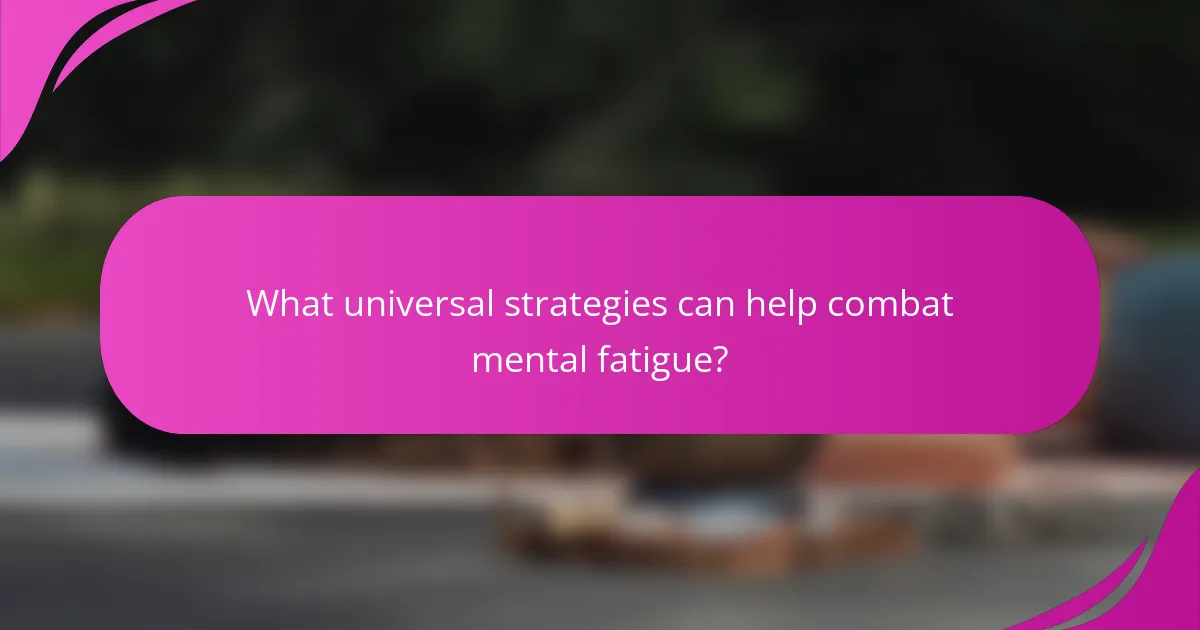
What universal strategies can help combat mental fatigue?
To combat mental fatigue, implement structured strategies that prioritise rest, nutrition, and mindfulness. These approaches enhance athletic recovery and overall well-being.
1. Prioritise Sleep: Aim for 7-9 hours of quality sleep nightly to rejuvenate the mind and body.
2. Optimise Nutrition: Consume a balanced diet rich in whole foods, focusing on hydration and nutrient-dense options to fuel performance.
3. Incorporate Mindfulness: Engage in meditation or deep-breathing exercises to reduce stress and improve mental clarity.
4. Schedule Breaks: Implement regular breaks during training or work to allow the mind to reset and recharge.
5. Limit Screen Time: Reduce exposure to screens, especially before bedtime, to improve sleep quality and mental focus.
6. Engage in Light Exercise: Incorporate low-intensity activities like walking or yoga to stimulate mental and physical recovery.
How does proper nutrition support mental recovery?
Proper nutrition significantly aids mental recovery by providing essential nutrients that enhance cognitive function and mood stability. Nutrients like omega-3 fatty acids, antioxidants, and B vitamins support brain health and reduce fatigue. For example, a study shows that diets rich in these nutrients improve mental clarity and focus, which are critical for athletes during recovery. Additionally, hydration plays a key role in maintaining cognitive performance, as even mild dehydration can impair concentration. Prioritising a balanced diet can lead to quicker recovery times and improved overall mental resilience.
What role does sleep play in reducing mental fatigue?
Sleep significantly reduces mental fatigue by enhancing cognitive function and promoting recovery. Adequate sleep improves focus, decision-making, and emotional regulation. Studies indicate that 7-9 hours of quality sleep per night is optimal for mental performance. Sleep also facilitates memory consolidation, which is essential for learning and problem-solving. Additionally, deep sleep stages contribute to the body’s recovery processes, reducing stress and fatigue levels. Prioritising sleep is a critical strategy in the Protocol for Life Balance, aiding athletic recovery and overall mental resilience.
How can hydration impact cognitive performance?
Hydration significantly enhances cognitive performance by improving focus, memory, and overall mental clarity. Studies show that even mild dehydration can impair cognitive functions, leading to increased fatigue and decreased attention. Optimal hydration levels support neurotransmitter function and brain metabolism, which are critical for mental tasks. Athletes, in particular, benefit from hydration as it aids recovery and maintains cognitive sharpness during physical exertion.
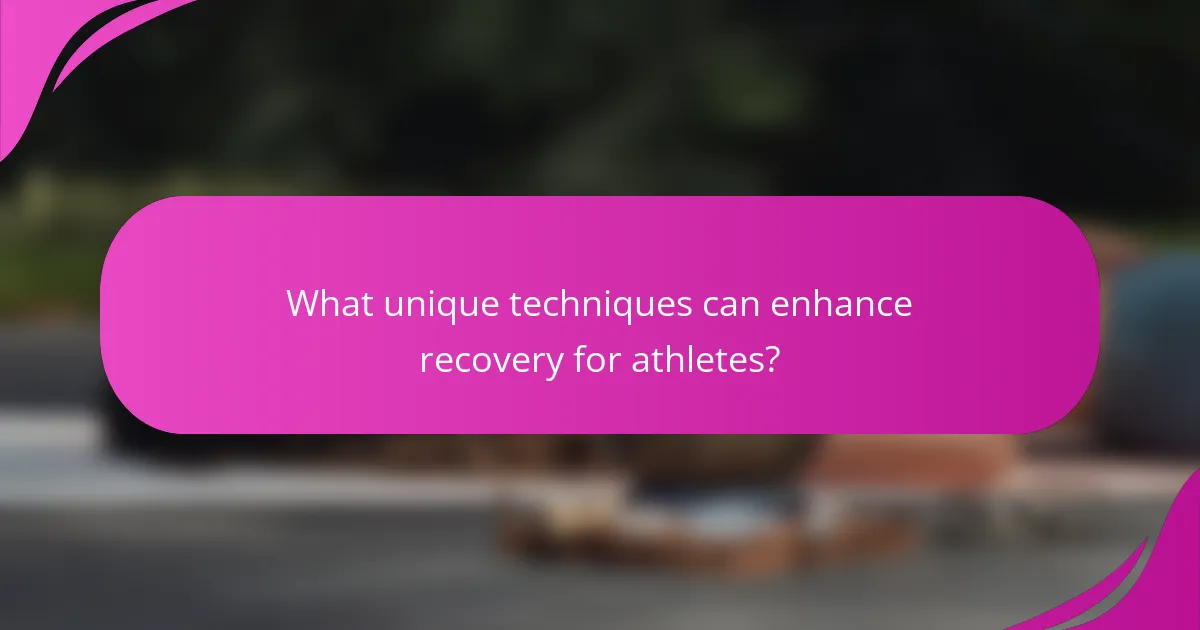
What unique techniques can enhance recovery for athletes?
Utilising unique techniques can significantly enhance recovery for athletes. Incorporating mindfulness practices, such as meditation and deep-breathing exercises, reduces mental fatigue and improves focus. Implementing structured recovery protocols, including active recovery sessions and adequate sleep hygiene, supports overall performance. Nutritional strategies, like anti-inflammatory diets rich in omega-3 fatty acids, can further aid recovery. Regularly assessing mental and physical states allows for tailored recovery plans, optimising outcomes.
How can cognitive behavioural strategies aid in mental recovery?
Cognitive behavioural strategies can significantly enhance mental recovery by promoting positive thought patterns and reducing mental fatigue. These strategies help athletes identify negative thoughts, challenge them, and replace them with constructive beliefs. As a result, athletes experience improved focus, reduced anxiety, and a greater sense of control over their mental state. Studies show that incorporating cognitive behavioural techniques can lead to a 30% increase in recovery speed among athletes. This approach not only aids in mental recovery but also enhances overall athletic performance.
What are the benefits of mindfulness and meditation for athletes?
Mindfulness and meditation significantly enhance athletic performance by reducing mental fatigue and improving recovery. These practices foster focus, increase resilience, and promote emotional well-being. Research indicates that athletes who engage in mindfulness techniques report lower stress levels and improved concentration during competitions. Additionally, meditation can facilitate faster recovery by enhancing sleep quality and reducing inflammation. Incorporating these strategies into training protocols can lead to a unique competitive edge, as athletes cultivate a balanced mental state essential for peak performance.
How can goal-setting techniques improve focus and motivation?
Goal-setting techniques enhance focus and motivation by providing clear objectives and measurable progress. These strategies help athletes prioritise recovery and manage mental fatigue effectively. Specific goals lead to increased commitment and a sense of achievement, which boosts motivation. Additionally, tracking progress fosters accountability, reinforcing positive behaviours that enhance athletic performance.
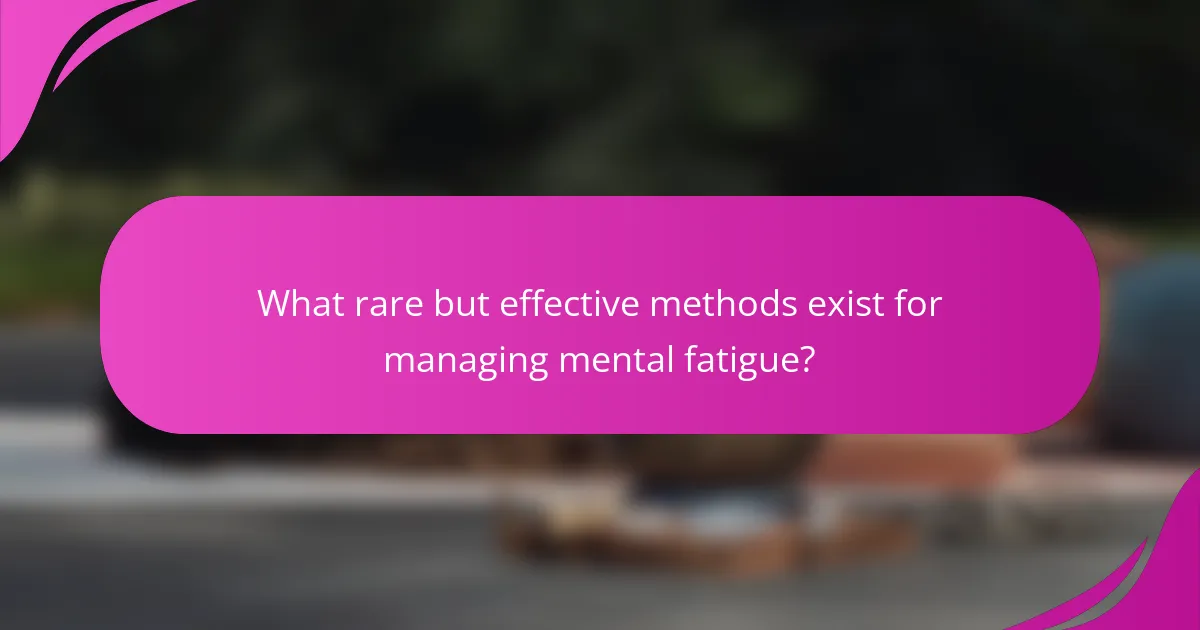
What rare but effective methods exist for managing mental fatigue?
To manage mental fatigue effectively, consider these rare methods: mindfulness meditation, which enhances focus and clarity; power naps, optimising cognitive function; nature immersion, reducing stress; and nutritional interventions, like omega-3 fatty acids, improving brain health. Each method uniquely contributes to mental recovery and overall well-being.
How can biofeedback be utilised for mental recovery?
Biofeedback can significantly aid mental recovery by enhancing awareness of physiological functions. It allows individuals to learn to control stress responses, which can reduce mental fatigue and improve overall athletic recovery. Techniques like heart rate variability training and neurofeedback provide real-time data, enabling targeted interventions that promote relaxation and mental clarity. As a result, athletes can recover faster and maintain optimal performance levels.
What is the impact of nature exposure on mental fatigue?
Exposure to nature significantly reduces mental fatigue, enhancing recovery for athletes. Studies show that spending time outdoors can lower stress levels and improve mood. Natural environments promote relaxation and cognitive restoration, which are crucial for effective athletic performance. Engaging in outdoor activities can lead to better focus and energy levels, ultimately aiding recovery.
How can art therapy contribute to athletic recovery?
Art therapy significantly aids athletic recovery by addressing mental fatigue and enhancing emotional resilience. It provides athletes with creative outlets to express feelings, reducing stress and anxiety. This therapeutic approach fosters a positive mindset, which is crucial for physical healing. Studies show that art therapy can improve motivation and focus, essential attributes for recovery. Engaging in artistic activities can also promote relaxation and mindfulness, further supporting the recovery process.
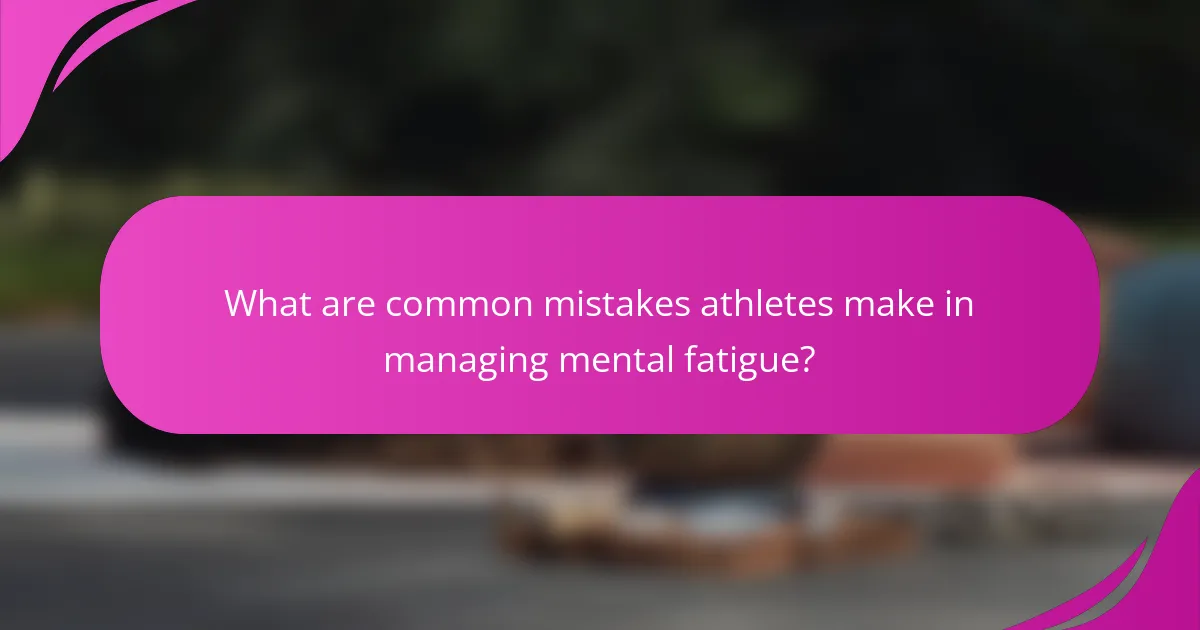
What are common mistakes athletes make in managing mental fatigue?
Athletes commonly make mistakes like neglecting recovery, underestimating mental fatigue, and failing to communicate feelings. These errors hinder performance and prolong recovery. Prioritising rest and mental health strategies can significantly enhance overall athletic performance. Lack of awareness about mental fatigue’s impact often leads to burnout. Additionally, inadequate nutrition and hydration can exacerbate fatigue, affecting focus and decision-making during competition.
How can overtraining lead to increased mental fatigue?
Overtraining can significantly increase mental fatigue due to excessive physical stress and inadequate recovery. This imbalance disrupts hormonal levels, particularly cortisol, leading to heightened anxiety and reduced cognitive function. As a result, athletes may experience decreased motivation and focus, hindering performance. Implementing a balanced recovery protocol, including rest days and mental relaxation techniques, can mitigate these effects and enhance overall athletic recovery.
What misconceptions exist about mental recovery strategies?
Misconceptions about mental recovery strategies often include the belief that they are solely about rest or that they lack scientific support. Many athletes think mental recovery is less important than physical recovery, which is untrue. Effective strategies, such as mindfulness and visualization, are backed by research demonstrating their benefits for mental fatigue. Another misconception is that these strategies require extensive time commitments; in reality, even short, focused sessions can yield significant improvements.
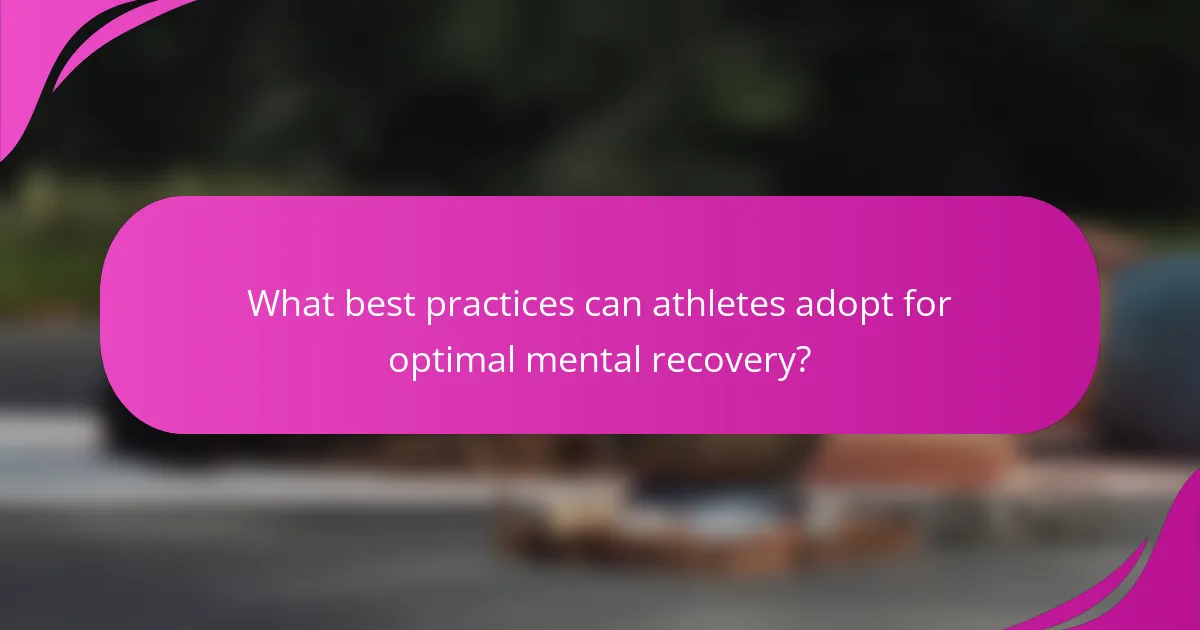
What best practices can athletes adopt for optimal mental recovery?
Athletes can adopt several best practices for optimal mental recovery, including mindfulness, structured rest, and social support. Mindfulness techniques, such as meditation, enhance focus and reduce stress, aiding recovery. Structured rest periods allow the brain to recuperate, leading to improved performance. Engaging with supportive social networks fosters a sense of belonging and emotional resilience, crucial for mental recovery. Additionally, maintaining a balanced routine that includes physical activity, healthy nutrition, and adequate sleep is essential for overall mental well-being.
How to create a personalised recovery plan?
To create a personalised recovery plan, assess individual needs, set specific goals, and incorporate tailored strategies. Start by evaluating mental fatigue levels and athletic performance. Include rest periods, nutrition adjustments, and mental wellness practices. Monitor progress regularly to refine the plan for optimal recovery.
What tools and resources can assist in monitoring mental fatigue?
Monitoring mental fatigue can be effectively supported by various tools and resources. Wearable technology, such as fitness trackers, provides real-time data on physiological metrics. Apps focused on mindfulness and meditation enhance mental clarity and reduce stress. Journaling tools help track mood patterns and fatigue levels. Biofeedback devices offer insights into stress responses, aiding in recovery strategies. Virtual coaching platforms provide personalised guidance for mental resilience. Lastly, educational resources on sleep hygiene and nutrition inform optimal recovery practices.
What expert insights can enhance recovery strategies for athletes?
Expert insights emphasise the importance of mental recovery strategies for athletes to combat mental fatigue. Incorporating mindfulness techniques can enhance focus and reduce stress, leading to improved performance. Regularly scheduled recovery sessions, including active rest and nutrition management, are vital for optimal physical and mental recovery. Engaging in cognitive behavioural strategies can also help athletes develop resilience against stressors, ultimately fostering a balanced mental state conducive to peak athletic performance.